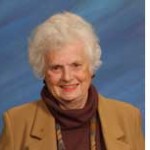By Natasha Josefowitz, Ph.D.

LA JOLLA, California — There wasn’t a cloud in the sky, nor haze on the horizon, so it was a perfect evening to see the green flash. A woman standing next to me had never seen one so I promised her that this would be the day. And so it was, not the sometimes vivid, Kelly-green one, but a little pale-green dot replacing the last vestige of the yellow spot of the sinking sun. She did not see it! So I thought about expectations. Our language leads to confusion. She expected a flash, a wow! It was hardly perceptible, but it was still there, a little green spot appearing on the horizon for an instant. We often fail to notice visible, but unexpected objects.
People have selective hearing. The only part that penetrates our brains is what confirms what is already there, and anything that negates our preconceived notions is easily dismissed as irrelevant or just not heard at all. The same applies to selective reading. We absorb the familiar and skip over the dissonant.
It is also true for selective seeing. Almost everything we see, observe, and notice influences our feelings, thoughts, decision-making, responses, and behavior. It is amazing how many pregnant women I suddenly noticed when I was pregnant, and I always notice red heads because I was one once.
When my cousin Janine (who loves gardens) was visiting, she noticed and pointed out plants and flowers on our path that I have never seen. I was pleasantly surprised at the variety and beauty of plantings I had never paid attention to; after her departure, I still notice them. She left me with the gift of seeing flowers anew.
Our brains can scan thirty to forty pieces of information per second. Most are immediately forgotten to prevent us from being overloaded. To help us cope with sensory overload, we develop filters that keep us focused on a single task and ignore the rest. Our brains are not meant to see everything. We learn to pick out patterns, combining them with a lifetime of experiences that allow us to predict what is likely to happen next.
So how do we hone our observational skills? Where and when are they most useful? It is important when we are with people, especially as we are often members of a group, both as participants and observers. We need to listen to and notice the group dynamics. There are several questions to keep in mind before we decide on our own role in the group: Who has influence? Power may be pre-ordained by a role—the president, the expert, the guest, the celebrity. Who gets the most eye contact, who seems to be the person addressed the most with comments or questions. Who initiated the topics of discussion? Were they supported? Who interrupts without impunity? Who is being interrupted? Who talks and is heard? Who speaks without being paid attention to? (The latter is all too often women.) Did everyone participate? Was an effort made to draw people out? Did a few dominate? Did anyone withdraw? Was leadership shared? There are people who deal mostly with the task at hand and those whose source of influence is dealing more with process; who encourages, who notices if someone has not contributed, who helps explore differences, who relieves tensions, and who maintains group harmony. In other words, it is not only what is said, but how it is said, received and responded to.
Always listen to the music behind the words, who flushes or pales, who shifts uncomfortably in their seat, who looks away, who slumps, who hesitates when speaking, who talks too softly (which sometimes translates to “I’m not sure that what I am saying is okay”) or who talks too loudly (which may be interpreted as “I know better” or “I am in control here.”) These are all clues that will help you understand and respond appropriately.
By working on your observational skills, including paying more focused attention to your reading, hearing, and seeing, you will notice the divergent opinions, what you disagree with, what you skip over and find unimportant. You will sharpen your intuition, increase your knowledge base, and respond appropriately to the people, the circumstances, the events surrounding you. You will know when to speak out, take on a leadership role, who needs help, and when to remain silent and leave well enough alone.
© Natasha Josefowitz. This article appeared initially in the La Jolla Village News. You may comment to natasha.josefowitz@sdjewishworld.com